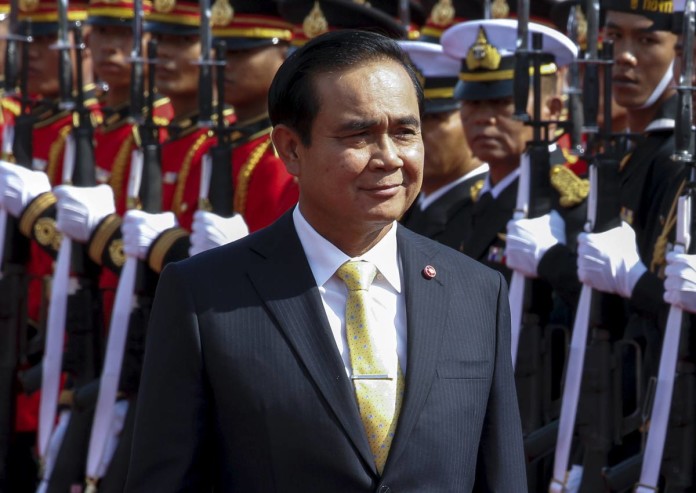BANGKOK – National Council for Peace and Order (NCPO) spokesman Colonel Piyapong Klinpan yesterday rejected reports that Prime Minister Prayut Chan-o-cha wanted to set up a military-dominated political party, saying the idea was initiated by other people based on the public’s desire for Prayut to continue running the country.
Prayut wanted to work to resolve the country’s problems, Piyapong said, adding that the prime minister had not told him that he wanted to enter politics or made a statement about accepting a role as an unelected premier in the next government.
Asked if he believed that Prayut would follow in the footsteps of former prime minister and Privy Council president General Prem Tinsulanonda, who was backed by political parties, Piyapong said that was also other peoples’ idea, not Prayut’s.
Sompong Sakawee, a member of the National Reform Steering Assembly’s political reform committee, who was quoted earlier as saying military officers had asked him about setting up a new party, said the idea of a military-nominee party might be premature.
He said military officers should ensure that any such proposed party belonged to the people and not monied interests, adding that the party should include bureaucrats and military officials who had experience running the country.
“The party leader may not necessarily include Prayut or [Deputy Prime Minister] Prawit [Wongsuwan] since we are not attached to certain individuals. If the format of the new party is like this, I believe this party would amass 4 to 5 million members,” he said.
Sompong said he disagreed with the proposal for Prayut to return as prime minister with the backing of political parties as Prem did because politics had changed.
“Everyone wants political reform and democracy. We must push for political party reform so that we have parties that truly belong to the people and we should not be attached to the ‘Prem model’,” he said.
Politics ‘must be reformed’
Meanwhile, Prayut said yesterday that politics must be reformed before an election, which was occurring in the ongoing drafting of organic laws.
Speaking at his weekly press briefing, Prayut said lawmakers must discuss how to reform political parties, but principally the process must conform with international democratic standards.
The most important point, he said, was the screening process for “good politicians”.
He said he had no idea how dependent political parties were on their financial supporters, but added that he gained business interests’ co-operation while not relying on their money, which suggested the government and private sector could co-operate when a “strong system” was in place.
Prayut said he was considering enacting a law concerning political donations, and stakeholders were also helping to analyse relevant aspects including personnel screening processes and political penalties.
However, the prime minister said such a law still might not attract new young politicians, who would still fear that conventional politics was too demanding in terms of accountability and the loss of privacy.
Meanwhile, NCPO spokesman Piyapong also dismissed criticism that the military wanted to extend its influence by appointing an additional 30 National Legislative Assembly (NLA) members.
“It entirely depends on the outlook of each person. But people should think of the responsibility of the NLA,” he said.
He said Deputy Prime Minister Wissanu Krea-ngam had said legal experts were needed to scrutinise more than 100 bills that would be passed before a general election because the NLA had just over a year left in its term.
Piyapong said Prayut had a team to help him to screen NLA candidates but he did not know if the prime minister would predominantly select military officials as appointees.






